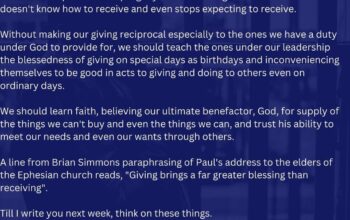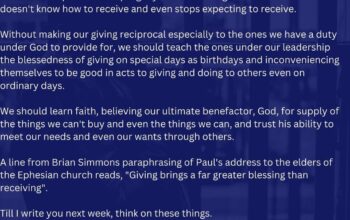Lessons from the Prodigal son’s father
Here it is, the sequel to MisterJacque’s second Blog Post, ‘lessons-from-the-prodigal-son-story/‘ (If you’ve not read it, please do well to see it so you get the whole gist) which took a critical look at actions and contemplations of the prodigal son in the light of what he did that he shouldn’t have done and what he didn’t do that he should have done, what he did right and what he did wrong. This is the father side of that story.
Disclaimer: Like In the first, for the purpose of this blogpost the interpretation isn’t imported along side the story. Thus, the father in this story isn’t seen as God, though we’ll learn some great stuff from him.
And he said, A certain man had two sons: And the younger of them said to his father, Father, give me the portion of goods that falleth to me. And he divided unto them his living. And not many days after the younger son gathered all together, and took his journey into a far country, and there wasted his substance with riotous living. And when he had spent all, there arose a mighty famine in that land; and he began to be in want. And he went and joined himself to a citizen of that country; and he sent him into his fields to feed swine. And he would fain have filled his belly with the husks that the swine did eat: and no man gave unto him. And when he came to himself, he said, How many hired servants of my father’s have bread enough and to spare, and I perish with hunger! I will arise and go to my father, and will say unto him, Father, I have sinned against heaven, and before thee, And am no more worthy to be called thy son: make me as one of thy hired servants. And he arose, and came to his father. But when he was yet a great way off, his father saw him, and had compassion, and ran, and fell on his neck, and kissed him. And the son said unto him, Father, I have sinned against heaven, and in thy sight, and am no more worthy to be called thy son. But the father said to his servants, Bring forth the best robe, and put it on him; and put a ring on his hand, and shoes on his feet: And bring hither the fatted calf, and kill it; and let us eat, and be merry: For this my son was dead, and is alive again; he was lost, and is found. And they began to be merry. Now his elder son was in the field: and as he came and drew nigh to the house, he heard musick and dancing. And he called one of the servants, and asked what these things meant. And he said unto him, Thy brother is come; and thy father hath killed the fatted calf, because he hath received him safe and sound. And he was angry, and would not go in: therefore came his father out, and entreated him. And he answering said to his father, Lo, these many years do I serve thee, neither transgressed I at any time thy commandment: and yet thou never gavest me a kid, that I might make merry with my friends: But as soon as this thy son was come, which hath devoured thy living with harlots, thou hast killed for him the fatted calf. And he said unto him, Son, thou art ever with me, and all that I have is thine. It was meet that we should make merry, and be glad: for this thy brother was dead, and is alive again; and was lost, and is found.
With Children some lessons can only be taught with practicals:
Immersing myself in this story we see a young man who is convinced that he could make judicious use of his inheritance, and why not, if possible have a dynasty of such magnitude or even larger than that of his father. In this young man I see one who being strong headed about some things disregarded the counsel of more experienced people, only to fall into the trap they saw ahead, which they saw but he couldn’t. Zeal is good, but better when it listens to Wisdom and takes knowledge with him. So the lesson he refuses to learn ‘in the classroom’ he learns with his scars.
When life beats them up, pick them up:
Just before the conclusion of the story we see a heart broken father run upon the sight of his long lost son approaching. Broke, busted and disgusted with ‘Wisdom’ enough to write books he’ll most likely title ‘Wait for your time’, or ‘It ain’t as easy as it looks’. Life had beat him up, shattered his self esteem, he was even less than a shadow of the person he used to be. Life took all he collected and couldn’t make judicious use of and left him with nothing but Rags, scars, regrets and lessons. But thank God for the father’s love that sees us coming and runs to meet us where we are, picks us up. This is how the father’s love is, and how a fathers love should be, it doesn’t remind us how guilty we are but whispers how loved we’ve always been.

We need to show our kids that our Love isn’t based on their performance:
How can a father still love a son who took a third of his wealth went to another country squandered it and comes back hagered, tattered, smelling of dry swine faeces? Its not written in the story but going by how keenly he anticipated the return of this long lost son of his, I feel he must have relocated to bedroom to the one closest to the gate of his Palatial residence, so he’ll be the first to see him, if and when comes back, Trust me if the father hadn’t run to embrace him when he saw him from afar the security at the gate wouldn’t have let him in. Its called the love of the father. It’s a love that’s not dependent on good behaviour. Coincidentally it births good behaviour, as righteousness by faith births good conduct.
Our Children should know that in us they’ll always find Bowels full of Mercy:
In this story I see a father who modelled forgiveness to his sons growing up, It could have been by forgiving his friends or family members who betrayed him, or forgiving debtors who couldn’t pay, it could also be forgiving his sons themselves when they erred, ofcourse not without enforcing discipline. But there was an assurance in the heart of this young man that though he wasn’t sure if he’ll restore him back to sonship or accept his plea to be made a servant , he’ll definitely forgive his trespasses. The responsibilty of fatherhood would require every ounce of forgiveness you can muster, thats why for those in the faith, we have been forgiven much so we can extend this forgiveness to others, especially our Children.

Forgiveness is a seed sown In the lives of the recipients, that makes us see transgressors in a different light:
It’s human for forgiveness to be a consequence of apology received, It’s divine for forgiveness to be given in the absence of apology. This father forgave long before his son got the chance to apologize, and has sown a seed of forgiveness in his son, this seed would in turn mature and make him be gracious to others regardless of their apology. This is how life lessons are taught, not just in word but in deeds. Deeds that will outlive us and make the world a better place, One act of forgiveness after another.
You could as well pray for them:
In the setting of the day this parable was spoken, it won’t be farfetched to see a father who every single time he went to the Temple to pray would remind God of his long lost son; Praying for his safety, return, and restoration. He prayed and believed God hence he waited and watched holding unto faith that his prayers for the return of his son have been answered. The power available to us In prayers can’t be overemphasised, men ought always to pray!!!

In concluding I’ll say,
A father’s love has more often than not been a contributory factor to If, when, and how a child will approach God as The father.
We could as well model God to our Children, not by feigning perfection but by loving and forgiving them in the midst of their imperfections, disobedience and shortfalls, most importantly because we’ve been forgiven much, and also because truth is, if you live long enough you’ll need the same shown to you.
Spread the word!!
With all of the father’s love.




